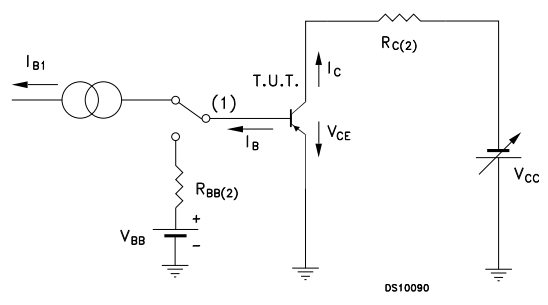
TIP147 Description
The TIP147 is a PNP Darlington transistor, it is manufactured using advanced planar technology with a "base island" layout and a monolithic Darlington configuration. This approach integrates both transistors of the Darlington pair into a single semiconductor chip, optimizing performance and reliability. The "base island" layout ensures that the base of the Darlington pair is isolated and well-defined, which minimizes leakage currents and enhances overall gain.
This device is equipped with exceptionally high current gain, typically exceeding 1000, which makes the TIP147 highly efficient in amplification and switching applications. Additionally, the transistor features a very low saturation voltage, which means that it can switch on and off with minimal voltage drop across its collector-emitter junction.
TIP147 Pinout

The TIP147 transistor pinout is as follows:
Base: The base is the control terminal that modulates the current flow between the collector and emitter.
Collector: The collector is the terminal through which the main current flows into the transistor.
Emitter: The emitter is the terminal through which the current flows out of the transistor.
TIP147 Symbol & Footprint

TIP147 Internal Schematic Diagrams

TIP147 Test Circuits


TIP147 Specification
| Parameter | Specification |
| Part Status | Active |
| Package | TO-247 |
| Collector-Emitter Voltage (Vceo) | 100V |
| Collector-Base Voltage (Vcbo) | 100V |
| Emitter-Base Voltage (Vebo) | 5V |
| Current - Collector (Ic) | 10A |
| Collector Current (Pulsed) | 20A |
| Vce Saturation (Max) @ Ib, Ic | 3V @ 40mA, 10A |
| Current - Collector Cutoff (Max) | 2mA |
| DC Current Gain (hFE) (Min) @ Ic, Vce | 1000 @ 5A, 4V |
| Power - Max | 125 W |
| Gain Bandwidth Product (fT) | 1MHz |
| Current Gain (hFE) | Typically 1000 (at Ic = 4A) |
| Saturation Voltage (Vce(sat)) | 2V (at Ic = 4A, Ib = 0.5A) |
| Storage and Operating Temperature Range | -65°C - 150°C |
| Thermal Resistance (Junction to Case, RθJC) | 1.9°C/W |
TIP147 Features
- Monolithic Darlington configuration
- Integrated antiparallel collector-emitter diode
- Offers a high current gain (hFE)
- Low saturation voltage
- High power handling
- Robust voltage ratings
- Wide temperature range
TIP147 Applications
Linear and switching industrial equipment
Power amplifiers
Motor control circuits
High-current relay drivers
Voltage regulators
Signal processing
TIP147 Package
The TIP147 transistor is housed in a TO-247 package, a robust and versatile component packaging commonly used for power transistors. The TO-247 package features a large metal tab for heat dissipation, which helps manage the transistor's thermal performance during operation. This package has three leads that are arranged in a line, typically labeled as the base, collector, and emitter.

How to Use TIP147?
First, connect the base pin to the control signal, which determines the operation of the transistor. The base should be driven with sufficient current to ensure proper operation. Next, connect the collector pin to the load or circuit through which the current will flow. The collector is typically linked to the higher voltage side of the circuit. Finally, connect the emitter pin to the ground or the lower voltage side of the circuit. This completes the current flow path through the transistor.
Once the connections are made, ensure that the large metal tab on the TO-247 package is attached to a heat sink or thermally conductive surface to prevent overheating. Additionally, verify that the transistor's voltage and current ratings are within the safe operating limits for your application to avoid damage.
FAQs
What is the purpose of TIP147's Darlington configuration?
The Darlington configuration, which combines two transistors in one package, provides a high current gain and improves the transistor's amplification capabilities.
How does the TIP147 compare to other power transistors?
Compared to other power transistors, the TIP147 offers high current gain and low saturation voltage, which are advantageous for driving high-current loads and minimizing power loss.
How does the TIP147 handle power dissipation?
The TIP147 is housed in a TO-247 package with a large metal tab for heat dissipation. It has a power dissipation capability of 65W when properly heat-sinked.